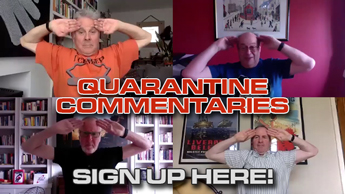 |
Making The Novel Graphic Ask any professional comic book artists to list their ten biggest influences, and you can bet that Will Eisner will be right up at the top. His creation - The Spirit - created much of the artistic language still used in comics today. And that was before he moved on to bigger and better things. Mr Flibble talks to the man who created the graphic novel... |

Andrew Ellard
Mr Flibble donned a mask and cape, affixed a natty penguin logo to his chest, and - whispering his request to Andrew - asked about Will's greatest creation, THE SPIRIT...
I'm a little awed by your statement! (Laughs) 'Greatest creation' - I don't know whether to agree or not! But I'll accept that. (Laughs)
The Spirit was a result of an effort to satisfy a problem, so to speak. The comic book medium was growing as a phenomenon, and somewhere in '38, '39, the Sunday newspapers became concerned about the fact that these magazines were beginning to lure away what they considered to be an important segment of their readership - the young teenagers.
So they asked if I could provide a newspaper insert which would be a comic book. By then I had built up a fairly good reputation as a producer. I always like to point out that, in hindsight, it wasn't that they thought that I was a great genius necessarily, but that they knew I could deliver!
What did that mean to you?
By then I was aware that this was going to be my life-long career. This opportunity gave me a new 'theatre,' it gave me adults and families. I could really write - in italics - seriously, approach this thing on a literary basis. Now that sounds very pretentious - and I suppose you're right, it was pretentious. I had literary pretensions.
They did make a condition that was very, very important to them, and that was that it ought to have, they felt, what they called in those days a 'costume character,' which we call 'superhero' today. To accommodate them, I created The Spirit.
Mr Flibble slipped embarrassedly away to remove his costume, leaving Andrew to cover for him and ask: What was the evolution of The Spirit?
I wanted to have a detective who would enable me to do all kinds of stories. I could have humorous and serious stories - explore all kinds of things. So they didn't argue with that - but they said they wanted a costume character. So finally, to accommodate that, I gave the character a mask, put a blue suit and gloves on him, and agreed to have him return from the dead, so to speak. That was how The Spirit began.
As far as I was concerned, The Spirit was, in effect, a walk-on. We had no inclination to do a superhero - with very good reason, too. Superheroes have a single dimension, it's very hard to do stories with characters who only have a single dimension. So I don't see him as necessarily competitive to [other] superhero characters. He doesn't belong in the superhero category, despite the fact he's wearing a mask.
Could you tell something about The Spirit's character?
I see The Spirit as a human being, as someone who is a crime-fighter in pretty much the same way that an accountant is an accountant. It's a business he's good at. He knows how to do it and it's a way of making a living. He doesn't take himself seriously and is slightly bemused by the world around him.
But after a while he was nothing more than a hat-rack on which I could hang the story. A peg, as we used to call it; he was a peg. Many of the Spirit stories that I wrote could have been told without him just as well.
Lets talk about your SUPPORTING CHARACTERS. Your fabulously curvaceous women, or the black side-kick, Ebony White...
Which would you rather I talk about? In either case I'm in trouble! (Laughs)
Every man who works in this field - whether he's writing short stories or novels, working in this medium or doing paintings - responds to his personal ideal of what is an attractive woman. Generally what turns him on. I'm generally turned on by a very intelligent, self-contained, confident woman whose seduction represents a substantial action. As one writer once said, 'To seduce the maid is no great trouble. But to seduce the duchess - that's an accomplishment!'
What about Ebony White?
As far as Ebony is concerned, he was a response to a humour of the time. I felt [that he was] a warm character, someone who would live with The Spirit in the underground crypt where he lived. He evolved. Arthur Miller once said that characters you create take control of you. That's what Ebony did. At first he was a solution to an immediate problem, and he gradually grew and evolved - more than The Spirit did. The Spirit remained essentially the same from the very beginning, but Ebony grew and evolved.
Mr Flibble sidled back in looking sheepish, (or should that be penguin-ish?) his cape under his wing. Taking over his interview by biting Andrew's ear, he asked Will to discuss his ARTISTIC STYLE...
I candidly admit that the early Spirits were motion-picture influenced. Motion pictures were a very important part of our life and we would ingest a huge amount of orientation from them. It wasn't an attempt to imitate - the thing I was responding to was that fact that motion pictures were beginning to dictate the language of imagery, as they do today. Later on I abandoned a lot of that.
In a film, Hollywood moves the audience. The camera becomes the audience and they move that camera up and down and sideways and so-forth. The only accommodation I do make to it is I use the angle of view as a psychological support. For example a birds-eye view removes the reader from involvement, gives the reader an impersonal view of the scene and allows the reader to orient himself to what's going on. Then if I drop the perspective to a worm's-eye view, for example, then I intensely involve the reader in the action and emotion.
Is emotion an important aspect of what you create?
I've always been in pursuit of an emotional connection between what I'm saying and my reader. Which is probably why I use devices like rain. I now have the reputation of what Harvey Kurtsman called 'Eisner-spritz', which is a fascination with rain. (Laughs) Rain and heat are the two things that readers understand.
Can you tell us how you came to coin the phrase 'GRAPHIC NOVEL'?
I began work in late '74 - after doing a couple of humour books, satirical books, just for the fun of it - on a book called A Contract With God, which was an extension of the capacities of this medium. I felt it could address itself to something more substantial than two mutants trashing each other.
I spent a year and a half producing this book. My idea was to take a tenement in the Bronx, which was the initial working title of the book, and do a set of stories - very much like Grand Hotel (1932) - and hang them all around a superintendent in that building.
What did you do when the book was completed?
I started to look for a publisher. I called Bantam in New York, whose president knew my work. I said, 'I've got something new.' He said, 'I'm interested, what is it?' I looked down at it as it was lying in front of me, I was holding the phone in my hand, and I thought to myself, 'I can't tell this guy it's a comic book!' So I said, 'It's a graphic novel.' That's how [the term] 'graphic novel' was born.
'Oh,' he says, 'that sounds fascinating. Bring it up here!' So we made an appointment - as a matter of fact the appointment was the following day, he was so eager to see it. I went up and I showed it to him. He looked at me after he had flipped through it and said, 'You know, this is still a comic book.'
Mr Flibble nodded - he once tried his wing at a graphic novel, but the story, Pingu Gets Blown Away With An AK47, didn't go down too well. Tell us about your SEMI-AUTOBIOGRAPHICAL book - To The Heart of the Storm...
The thing became autobiographical, in spite of me! The longest most painful - and least expensive - therapy that anybody's ever been through! (Laughs) I was my own therapist.
I was dealing with things that you have to take position on - for example, your parents. How do you explain? How do you talk about your parents to a stranger? (Because when you're writing you're talking to strangers.) What do your parents look like to you? We all know that three or four children see the same parent differently. I had to deal with that. It took me close to two years to write that book.
You've done a lot of teaching of the subject of comics and graphic novels. Do have have a desire to pass what you've learned on?
In the course of teaching I realised that all the things I understood about when you write in this medium - beyond the visceral approach you take - needed to be said. No-one had said anything about it. So I wrote a book in which I attempted to explain the medium. My interest was in explaining it to university art teachers and very serious, more advanced, professionals. It wasn't written for the kid who wants to know how to draw noses and ears!
Mr Flibble enjoyed talking to Will Eisner, and now that it's over... Mr Flibble's very cross.














